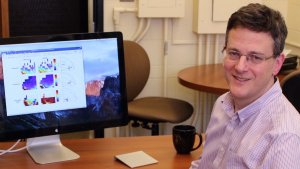
Message from the CMOS President for February 2019: Advancing Climate Action in Canada
– By Paul Kushner, Professor, Department of Physics, University of Toronto and CMOS President –
At the end of February I was grateful for the special opportunity to participate in the National Climate Change Science and Knowledge Priorities Workshop in Ottawa, a well-organized event hosted by Environment and Climate Change Canada. The workshop brought together a wide variety of experts and stakeholders from the natural and social sciences; from First Peoples, federal, provincial and municipal organizations; and from NGOs and industry. It covered research needs and priorities to best advance climate action in Canada, with a particular focus on accomplishing the objectives of the Pan-Canadian Framework on Clean Growth and Climate Change.

We sought to identify knowledge gaps and opportunities for Canadian research in climate change science, from fundamental research, to climate change modelling, to bringing climate data to local scales, and to research on impacts and adaptation for Canadians. We thought about how to address multidisciplinary research challenges, how to carry out integrated research and ensure knowledge mobilization, and how to translate research results into climate action. This ambitious agenda was pursued across four key themes: 1) resilient communities and the built environment, 2) a carbon neutral society, 3) resilient ecosystems, freshwater and marine resources, and 4) sustainable natural resources. As a university-based climate scientist who focuses on atmospheric dynamics and cold region processes it is humbling to consider the vast range of climate change impacts that planners and policymakers have to factor in to establish a strategic vision for Canada’s investments in this area. My colleagues from academia and government labs who are involved in fundamental climate science made sure to highlight the continued need for investing in fundamental research in light of the many uncertainties that remain in projected future climate. But we, and all those present, took responsibility for making sure fundamental research would be oriented towards actionable and relevant knowledge beneficial to Canadians in all regions and areas of concern.
This kind of gathering is exactly the kind of dedicated effort we have been advocating for within the Atmosphere-Related Research in Canadian Universities Special Interest Group of CMOS (CMOS ARRCU SIG, arrcu.ca). From this exposure, to the landscape of climate adaptation and impacts research in Canada, I am convinced that there is an urgent need to train new practitioners in climate change science who are abreast of the rapid developments in this field. Sound science needs to be at the foundation of any efforts to mitigate and plan for climate change.
I enjoyed interacting with this engaged and passionate group over a lively two days of panels, breakout discussions, and small-group chats in the corridors of the Shaw Centre in downtown Ottawa and over dinner. I look forward to sharing with you the outcomes of this workshop, which I hope will lead to a coherent federal science research plan with strong opportunities for contributions from the CMOS community.
In other news, all of us on Council are excited by the prospect of the upcoming IUGG General Assembly in Montreal which is locally organized by CGU, CMOS, and JPDL Inc. The IUGG GA runs 8-18 July, but the IAMAS, IAPSO, and IAHS sessions relevant to most of the CMOS membership run during the first week 8-13 July (see http://iugg2019montreal.com/iugg-program.html). Thousands of abstracts have been submitted and our local CMOS organizing team led by Dominique Paquin is putting together a full set of CMOS meetings. We are going to make sure that the Society’s regular business, including its Annual General Meeting and banquet, is executed in full. To help develop a more environmentally sustainable practice for the society, CMOS will, for the first time, allow online participation through remote conference call and web access – including the ability to vote – for the AGM. We will also extend this to other committee meetings as logistics permit. So, even if you can’t make it to la belle province for IUGG, do make sure to take advantage of this opportunity to engage with us off site: dial in and participate in the AGM and contribute to the important business of your Society.

ARRCU, CMOS Congress, Environment and Climate Change Canada, Pan-Canadian Framework, Paul Kushner
